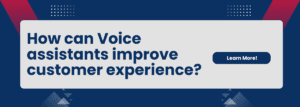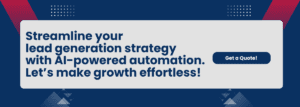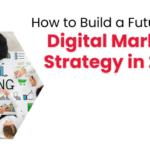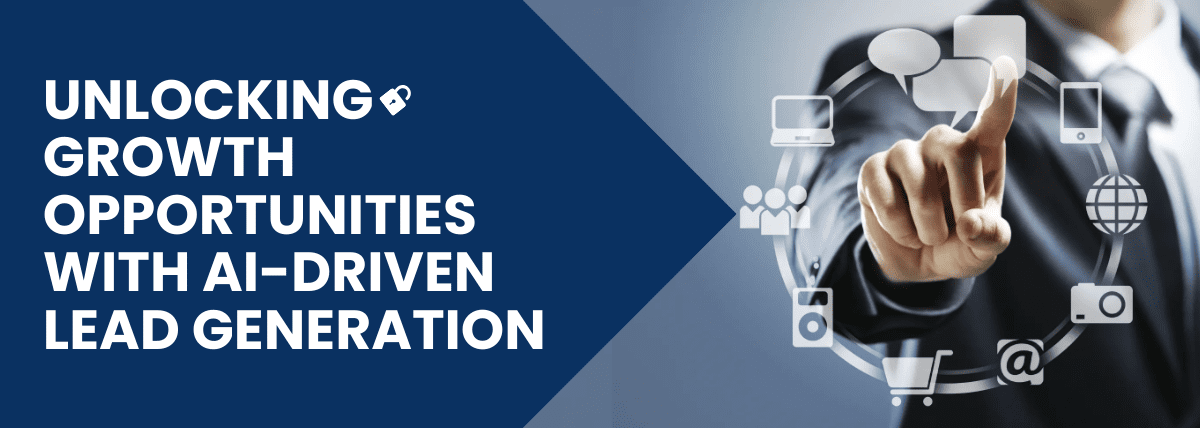
Unlocking Growth Opportunities with AI-Driven Lead Generation
AI and its impact on lead generation
Artificial Intelligence (AI) has revolutionized the way businesses approach lead generation by automating and optimizing processes that were once manual and time-consuming. AI-driven technologies leverage advanced algorithms, machine learning, and data analytics to identify potential leads, nurture them, and convert them into customers more effectively. AI tools can predict buyer behavior, segment leads based on data patterns, and even personalize communication at scale, making it possible for businesses to target the right prospects with precision. By automating repetitive tasks like follow-ups and lead scoring, AI significantly enhances the efficiency of lead generation efforts.
Why is AI-powered lead generation becoming essential for businesses?

AI-powered lead generation is increasingly vital for businesses as it enables them to handle large volumes of data and leads efficiently. With the ability to analyze vast amounts of customer data in real-time, AI can identify high-quality leads faster than traditional methods. This leads to better-targeted marketing campaigns and more personalized outreach. AI also helps businesses save valuable time and resources by automating repetitive tasks, reducing human error, and enhancing decision-making processes. As customer expectations grow and competition intensifies, leveraging AI in lead generation allows businesses to stay ahead by delivering a more tailored, responsive, and efficient experience for potential customers.
AI-Powered Lead Generation: 11 Reasons You Can’t Afford to Miss

Enhanced Efficiency and Timesaving
AI-powered lead generation tools automate a range of time-consuming tasks, such as data collection, sorting through large sets of leads, lead scoring, and automated follow-ups. These processes would traditionally take up significant amounts of time and human resources. With AI, businesses can streamline these functions, ensuring that sales teams can focus on more strategic tasks, like building relationships, solving complex customer problems, and closing sales. The automation of repetitive tasks boosts productivity and allows organizations to handle larger volumes of leads without overloading their workforce.
Improved Lead Scoring
Lead scoring is a critical element in the sales pipeline, as it helps identify which leads are most likely to convert into customers. AI models leverage machine learning algorithms to analyze past behavior, demographic data, interaction history, and online engagement to assign scores to each lead. This predictive analytics approach ensures that sales teams prioritize high value leads that are more likely to make a purchase. By focusing on qualified leads, businesses can increase their conversion rates and avoid wasting time on low-potential prospects.
Personalized Lead Nurturing
AI enhances lead nurturing by leveraging data analytics to gain insights into individual customer preferences, behaviors, and interactions with the brand. With this data, AI can generate highly personalized content, such as emails, recommendations, and product suggestions, tailored to the needs of each lead. AI can segment leads more accurately, ensuring that each prospect receives relevant messaging at the right time in the sales funnel. This personalized approach improves engagement, builds trust, and ultimately leads to stronger, more lasting relationships with prospects.
24/7 Lead Engagement
AI-powered chatbots and virtual assistants provide businesses with the ability to engage leads at any time of day, addressing inquiries, answering questions, and providing information. This capability ensures that businesses never miss out on potential customers, even outside regular office hours. These AI-powered systems are trained to understand natural language and provide intelligent responses, making them capable of handling complex queries and guiding prospects through the sales process without requiring human intervention. This constant availability results in quicker responses, better lead retention, and enhanced customer experience.
Data-Driven Insights
AI uses advanced analytics and machine learning algorithms to process vast amounts of data from multiple sources, such as customer interactions, website behavior, social media activity, and previous purchasing patterns. By identifying trends, preferences, and pain points, AI can help businesses gain a deeper understanding of their target audience. These insights allow for the optimization of lead generation strategies, enabling businesses to tailor their outreach efforts to the specific needs of different customer segments. This data-driven approach improves the targeting of marketing campaigns, leading to better results.
Reduced Human Error
AI minimizes the chances of human errors in tasks like data entry, lead categorization, and follow-up scheduling. Unlike manual processes, AI systems can automatically update lead records, track interactions, and set reminders for timely follow-ups, all without introducing human mistakes. The use of AI ensures that data remains consistent and accurate, allowing businesses to maintain high-quality lead management systems. This leads to fewer mistakes in reporting, better segmentation, and higher-quality data for decision-making.
Scalability
As businesses grow, manually managing large volumes of leads becomes increasingly difficult. AI tools are inherently scalable, meaning they can handle an increasing amount of data without requiring significant infrastructure changes or additional resources. AI-driven platforms are designed to process and analyze vast datasets, identify patterns, and automate tasks at a much higher rate than humans can. This scalability allows businesses to maintain operational efficiency, even as their lead generation needs expand, without compromising the quality of service or losing out on potential leads.
Better Customer Segmentation
AI takes customer segmentation to the next level by analyzing a wide variety of data points including demographic information, purchase history, online behavior, and interaction history. Machine learning algorithms can identify distinct groups within the customer base and segment them into more granular, behavior-based categories. This enables businesses to target different segments with highly relevant content, improving engagement and conversion. AI-driven segmentation helps refine marketing efforts and ensures that sales teams focus on the most profitable groups.
Cost-Effectiveness
AI-powered lead generation helps businesses reduce their reliance on manual labor and traditional marketing resources, which can be expensive and inefficient. By automating repetitive tasks and streamlining lead management processes, businesses can cut down on operational costs. Furthermore, AI tools can help businesses achieve higher returns on investment (ROI) by improving the efficiency of lead nurturing, qualifying, and converting processes. Over time, the automation of lead generation reduces costs associated with human resources and maximizes productivity.
Improved Lead Qualification
AI enhances lead qualification by analyzing the actions and behaviors of leads to determine which ones are most likely to convert. Using real-time data, AI assesses various signals such as interactions with emails, website visits, and engagement with marketing materials to prioritize leads based on their readiness to buy. This ensures that sales teams only focus on high-potential leads, which improves the efficiency of the sales process and increases conversion rates. AI’s ability to qualify leads faster and more accurately ensures that time and resources are used efficiently.
Predictive Analytics
AI-powered predictive analytics leverages historical data, such as past customer behavior and engagement patterns, to forecast future trends and identify potential leads. By analyzing these historical trends, AI can predict which leads are more likely to convert and which ones might require further nurturing. This forward-looking approach allows businesses to take proactive measures in targeting high value leads earlier in the sales process, rather than waiting for them to show interest. Predictive analytics helps businesses to act on opportunities before they arise, leading to more effective sales strategies and improved growth potential.
How DWH Empowers Your Business with AI-Driven Lead Generation?
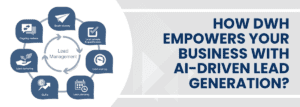
DWH helps businesses harness the full potential of AI-driven lead generation by providing advanced analytics, predictive lead scoring, and personalized engagement. Through AI-powered lead generation services we enable businesses to analyze customer data, predict conversion likelihood, and target high-quality leads more effectively. Our automation capabilities streamline the entire lead generation process, saving time while increasing scalability. Additionally, DWH offers real-time insights to optimize engagement strategies, ensuring businesses reach prospects at the right moment with the right message. By partnering with DWH, companies can significantly improve ROI and drive sustainable business growth through smarter, data-driven decisions.
Key Takeaways
AI-driven lead generation revolutionizes how businesses attract and convert prospects by seamlessly integrating automation, precision, and personalization into the sales process. By analyzing vast amounts of customer data in real time, AI identifies high-quality leads, predicts buyer behavior, and tailors outreach efforts to resonate with individual preferences. This enables businesses to engage prospects more effectively through personalized interactions, automated follow-ups, and smarter lead scoring.
AI also minimizes manual errors, reduces operational costs, and ensures continuous engagement with tools like chatbots, fostering better customer experiences. As these technologies scale effortlessly with business growth, they empower teams to focus on strategic goals while optimizing ROI. By connecting every stage of lead generation with data-driven insights, AI equips businesses to stay competitive and meet evolving market demands with efficiency and precision.

